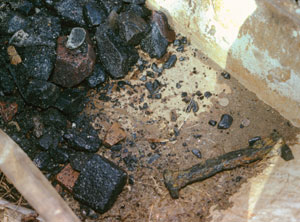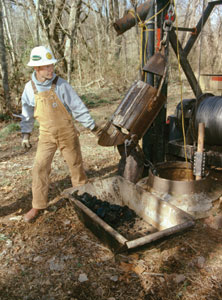Sewer Cleaning is Fundamental
October 1, 2008
 Most drivers have experienced the frustration of a major traffic jam on the freeway. Hundreds of automobiles backed up for miles, inching along at a few feet per minute. Inevitably you arrive at the source of the delay and find that it’s a single, stalled vehicle. One car, strategically placed, has caused traffic to slow to a crawl.
Most drivers have experienced the frustration of a major traffic jam on the freeway. Hundreds of automobiles backed up for miles, inching along at a few feet per minute. Inevitably you arrive at the source of the delay and find that it’s a single, stalled vehicle. One car, strategically placed, has caused traffic to slow to a crawl.So it is with sewers. Often a single blockage in a major outfall line reduces pipe capacity and causes backups and surcharges. Only a few feet of obstruction can limit the flow within an entire line, and it’s true of small diameter pipes and large pipes as well.
The City of Charlotte, N.C., has discovered the value of cleaning large diameter outfall sewer lines, thanks to a program that began in 1999. Charlotte-Mecklenburg Utilities (CMU) currently has a contract with Bio-Nomic Services to clean and inspect approximately 70,000 ft of the city’s 1 million ft of outfall trunk lines. According to CMU’s program manager, the investment in cleaning is money well spent.
“Cleaning and inspection are very important components of our sewer rehabilitation program,” said Keith Shirley, a 20-year veteran with CMU. “Outfalls are the foundation of your system. Cleaning is a very economical way to recapture lost capacity, plus it allows us to accurately evaluate the condition of our sewers. Cleaning is fundamental to our program.”
Regain Capacity
 According to Shirley, cleaning produces a number of benefits, the first being increased capacity. Surcharges often occur during heavy rain events because collector lines that are semi-clogged with debris cannot accommodate the added volume that occurs during excessively wet conditions. Some public utilities have misdiagnosed sewer problems, thinking they needed larger outfall lines when they really only needed to clean the existing pipes.
According to Shirley, cleaning produces a number of benefits, the first being increased capacity. Surcharges often occur during heavy rain events because collector lines that are semi-clogged with debris cannot accommodate the added volume that occurs during excessively wet conditions. Some public utilities have misdiagnosed sewer problems, thinking they needed larger outfall lines when they really only needed to clean the existing pipes.“A few years ago we had a situation where they did flow monitoring before and after we cleaned a 48-in. pipe,” said Peter Fleetwood, president of Bio-Nomic Services. “We increased the flow capacity within the line by 2.9 million gallons per day. That is a considerable amount of additional flow in a 48-in. line.”
Pipe assessment is another important benefit of sewer line cleaning. It is virtually impossible to get quality video.
“The amount and type of debris we remove from the lines is incredible,” said Shirley. “We haul away truckloads of debris, including bricks, mortar, pieces of frame from the manholes and silt. We’ve even removed a toilet and a vacuum cleaner. It’s amazing what can end up in a sewer.”
The current cleaning contract was issued in September 2007 and will soon be completed. Shirley said getting the budget approved for another contract might be easier due to past results.
“I just show my superiors the photographs of the materials we remove from the line,” he explained. “The program promotes itself when you see the photos.”
A Smart Investment
 When sewers are clean, municipalities can accurately assess the condition of buried pipes. In the case of Charlotte-Mecklenburg Utilities, the cleaning program has returned many tangible results. For example, during an inspection of a recently cleaned sewer line, public works officials were made aware of a gaping hole in a pipe located beneath a creek bed. Flow monitoring showed that the line was allowing about 40,000 gals of water a day to enter the system. With treatment costs of $1.25 per thousand gals, the leak was costing the city about $18,000 annually in unnecessary treatment expenses. The line was replaced, eliminating the leak and the additional water treatment expenses that the leak created.
When sewers are clean, municipalities can accurately assess the condition of buried pipes. In the case of Charlotte-Mecklenburg Utilities, the cleaning program has returned many tangible results. For example, during an inspection of a recently cleaned sewer line, public works officials were made aware of a gaping hole in a pipe located beneath a creek bed. Flow monitoring showed that the line was allowing about 40,000 gals of water a day to enter the system. With treatment costs of $1.25 per thousand gals, the leak was costing the city about $18,000 annually in unnecessary treatment expenses. The line was replaced, eliminating the leak and the additional water treatment expenses that the leak created.“When you clean and inspect sewer pipes, you find those kinds of things,” said Mark Lambert, P.E., of Frazier Engineering, the company that monitored the damaged line. “Otherwise, that leak may have gone undetected for years.”
CMU has discovered that sewer cleaning is a smart investment in its city’s wastewater infrastructure. “We believe that cleaning is one of the most important maintenance projects we perform,” said Shirley.
Steve Gibbs is a freelance writer based in Memphis, Tenn., with 20 years of experience covering public works and construction projects for regional and national publications.
